Market
Latam Crypto News: Mexico Investigates Worldcoin
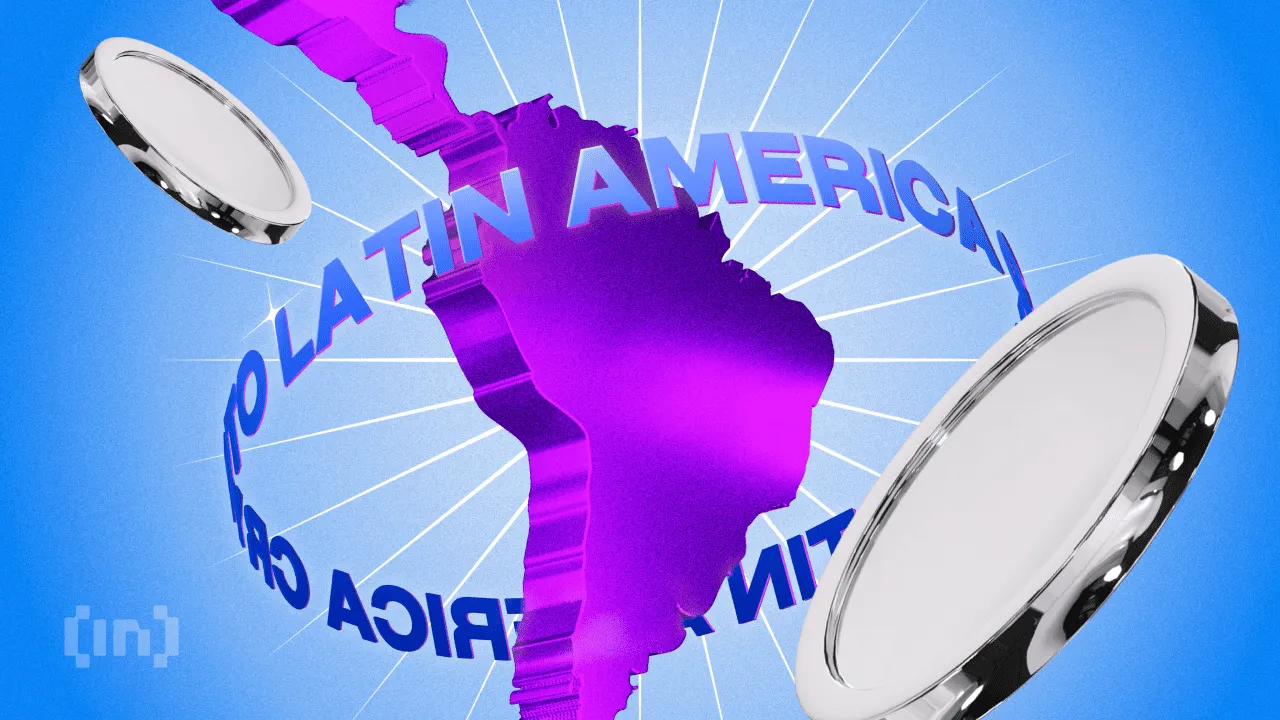
BeInCrypto comprehensive Latam Crypto Roundup brings Latin America’s most important news and trends. With reporters in Brazil, Mexico, Argentina, and more, we cover the latest updates and insights from the region’s crypto scene.
This week’s roundup covers Mexico’s investigation into iris-scanning project Worldcoin, MicroStrategy CEO’s speech in Argentina, and more.
María Corina Machado Proposes Bitcoin as Venezuela’s Reserve Asset
María Corina Machado, leader of Venezuela’s opposition to Nicolás Maduro’s government, has introduced a bold proposal to tackle the country’s economic crisis: adopting Bitcoin as a national reserve asset.
“We are grateful for the lifeline that Bitcoin provides, and we hope to adopt it in a new and democratic Venezuela,” Machado said in an interview with Alex Gladstein, Strategy Director at the Human Rights Foundation.
During the interview, Machado emphasized Venezuela’s economic collapse, noting that inflation has skyrocketed by 8,000,000% since 2016. This catastrophic situation has forced millions of Venezuelans to flee the country in search of stability. In addressing Venezuela’s economic woes, Machado stressed the pivotal role Bitcoin has played for many.
“Some Venezuelans found a lifeline in Bitcoin during hyperinflation, using it to protect their wealth and finance their flight. Today, Bitcoin bypasses government-imposed exchange rates and thus helps many of our people. It has evolved from a humanitarian tool to a vital means of resistance,” she explained.
Read more: How to Protect Yourself From Inflation Using Cryptocurrency
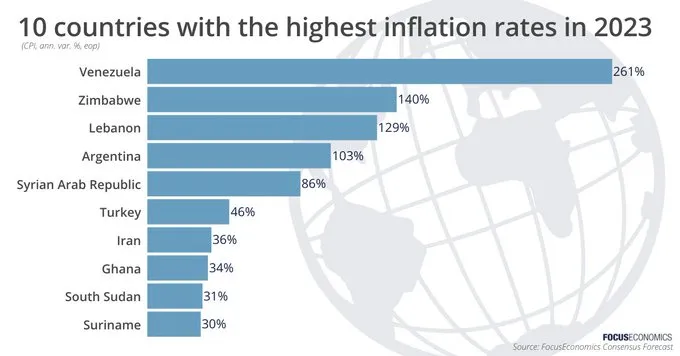
Machado also highlighted how Latam country’s citizens have turned to crypto to shield their assets amid hyperinflation, stressing that the cryptocurrency could be crucial in rebuilding the nation’s economy.
“We visualize Bitcoin as part of our national reserves, helping to rebuild what the dictatorship stole. […] Fortunately, unlike bank transfers, which the regime usually blocks, Bitcoin donations cannot be seized. Let’s use this technology to achieve the change that Venezuela desperately needs,” she concluded.
Machado’s proposal positions Bitcoin not only as a financial tool but as a cornerstone for the country’s recovery and resistance against government control.
MicroStrategy CEO Praises Bitcoin During Visit to Argentina
Phong Le, CEO of MicroStrategy, recently attended the “MicroStrategy World: Buenos Aires Edition” event in Argentina, where he shared his insights on Bitcoin and the future of corporate solutions.
During his keynote speech, titled “Let the Data Lifeblood Flow & Bitcoin for Corporations and Government,” Le discussed the impact of artificial intelligence in the workplace, as well as the company’s strategy regarding AI and Bitcoin. He reaffirmed his strong belief in cryptocurrencies, calling Bitcoin “the best financial technology ever invented.”
Reflecting on MicroStrategy’s Bitcoin journey, Le recounted the company’s decision to add BTC to its balance sheet in 2020. He noted the coin’s rise from $11,000 to $67,000 and acknowledged the market downturn following the collapse of fraudulent entities like FTX and Terra Luna.
“In 2020, our company decided to put BTC on its balance sheet. Later, Square did the same. Three months later, Tesla. This is what we call corporate adoption,” he explained.
Read more: Who Owns the Most Bitcoin in 2024?
From a geopolitical standpoint, Le believes Bitcoin could play a key role in shaping the global financial landscape. He predicted that more countries would follow El Salvador’s lead, which adopted Bitcoin as legal tender in 2021.
Le also touched on the upcoming US presidential elections, noting Donald Trump’s pro-Bitcoin stance. “If you want to be the most powerful or relevant country, you have US dollars, you have gold, and you should have BTC,” Le stated. MicroStrategy remains the largest institutional Bitcoin holder, with 226,500 BTC — over 1% of the total Bitcoin supply.
El Salvador’s Financial System Converted Only $6.6 Million to Bitcoin, Reports GAFI
A recent report from the Latin American Financial Action Task Force (GAFILAT) highlights the minimal impact Bitcoin has had in El Salvador since its adoption as legal tender. Despite being the first country to embrace the cryptocurrency, the financial system has only converted $6.6 million to Bitcoin between 2021 and 2024. This amount represents a mere 0.03% of the assets managed by the country’s major banks.
While the Latam country’s government remains optimistic about Bitcoin, GAFILAT’s findings suggest that the crypto has yet to significantly influence the national economy. Remittances sent via digital wallets account for less than 1% of total remittances received. In the first seven months of 2024, Salvadorans abroad sent $49.7 million through digital wallets, a 6.3% decline compared to the previous year.
The report also notes that Salvadoran banks have set strict limits on automatic Bitcoin-to-dollar conversion, capping transactions at $200,000. Additionally, alert systems are in place to detect suspicious activity, though GAFILAT warns that digital asset exchanges still carry risks, including potential use for unregulated cryptocurrency transactions.
Read more: Crypto Regulation: What Are the Benefits and Drawbacks?
Since Bitcoin’s adoption in September 2021, the government established a convertibility trust managed by the Development Bank of El Salvador (Bandesal). However, details regarding the amounts converted remain classified.
Meta has announced that it will inform users in Brazil about how their personal data is used to train its Artificial Intelligence (AI). Notifications will be sent via email and through Facebook and Instagram, asking for permission to use their data.
In July, Meta suspended its Generative AI tool in Brazil after the National Data Protection Authority (ANPD) requested changes to its privacy policy. Despite Meta’s efforts to comply with AI regulations in the country, the tool was halted. Now, the Brazilian Ministry of Health will inform citizens about how Meta plans to use their data, with users given the option to decline.
“We are disappointed with the ANPD’s decision. AI training is not unique to our services, and we are more transparent than many in the industry who have used public content to train their models,” Meta explained. “Our approach complies with Brazilian privacy laws, and we will continue to work with the ANPD to address their concerns. This is a setback for innovation and AI competitiveness, delaying the benefits of AI for people in Brazil.”
Read more: How To Invest in Artificial Intelligence (AI) Cryptocurrencies?
Global efforts to regulate AI remain scattered. In March, the European Parliament passed a regulation aimed at curbing AI practices that infringe on human rights. This includes bans on AI for biometric categorization and unauthorized photo or video captures.
“Thanks to the Parliament, unacceptable AI practices will be banned in Europe, and the rights of workers and citizens will be protected. The new AI Office will help companies comply before the rules take effect. We are ensuring that human values remain central to AI development,” the Parliament stated.
Additionally, the United Nations General Assembly proposed a resolution to create governance systems for AI. The UN urged member states to avoid AI practices that violate human rights or hinder societal development, pushing for systems that promote safety, inclusivity, and sustainable technological growth.
Mexico’s INAI Launches Investigation Into Worldcoin
Adrián Alcalá, president commissioner of Mexico’s National Institute for Transparency, Access to Information, and Protection of Personal Data (INAI), announced that an investigation will be initiated against Worldcoin (WLD) for allegedly obtaining personal data without proper consent.
In recent weeks, Worldcoin has come under fire in several Latam countries, including Chile, Colombia, Ecuador, and Argentina, all raising concerns about crypto project’s data collection practices. The accusations center on improper handling and misuse of personal data. Alcalá confirmed that INAI will now look into potential data violations by Worldcoin, which has been operating in Mexico since last year.
“We initiated an ex officio investigation to analyze the possible data breach by Worldcoin. We invite all persons who feel their information was compromised to file complaints,” Alcalá shared on X.
Read more: What Is Worldcoin? A Guide to the Iris-Scanning Crypto Project
The company is also facing growing criticism from users who claim their privacy was violated. Customers have alleged they were “scammed” by not receiving the promised cryptocurrency payments, and some accuse the company of scanning the irises of minors.
In April, Mexican Congresswoman María Eugenia Hernández introduced a proposal to investigate Worldcoin’s operations. She highlighted the importance of safeguarding Mexicans’ personal data, noting that Mexico had not yet addressed the issue as other nations had. Hernández emphasized the need for clear rules on how private companies handle citizens’ biometric data.
“We cannot allow our citizens’ data to be in the hands of private individuals without clear guidelines for its use. It’s crucial to raise awareness about what this company is doing and the risks of continuing to exchange biometric data for a few cryptocurrencies,” Hernández said.
As the Latam crypto scene grows, these stories highlight the region’s increasing influence in the global market. Stay tuned for more updates and insights in next week’s roundup.
Disclaimer
In adherence to the Trust Project guidelines, BeInCrypto is committed to unbiased, transparent reporting. This news article aims to provide accurate, timely information. However, readers are advised to verify facts independently and consult with a professional before making any decisions based on this content. Please note that our Terms and Conditions, Privacy Policy, and Disclaimers have been updated.
Market
Report Alleges Massive Meme Coin Sniping on Pump.fun

According to a new report from Pine Analytics, token deployers on Pump.fun systematically funded sniper wallets to buy their own meme coins. This impacted over 15,000 token launches on the platform.
These sniper wallets operated primarily during US trading hours, executing standardized, profitable strategies. Unrelated bot activity obscures their behavior, making it extremely difficult to isolate these wallets—and they can readily adapt to new countermeasures.
Snipers Roam Free on Pump.fun Meme Coins
Pump.fun has remained one of the most popular meme coin launchpads on Solana despite persistent controversies and other criticism.
However, Pine Analytics’ new report has uncovered a new controversy, discovering systematic market manipulation on the platform. These snipes include as much as 1.75% of all launch activity on Pump.fun.
“Our analysis reveals that this tactic is not rare or fringe — over the past month alone, more than 15,000 SOL in realized profit was extracted through this method, across 15,000+ launches involving 4,600+ sniper wallets and 10,400+ deployers. These wallets demonstrate unusually high success rates (87% of snipes were profitable), clean exits, and structured operational patterns,” it claimed.
Solana meme coin deployers on Pump.fun follow a consistent pattern. They fund one or more sniper wallets and grant them advance notice of upcoming token launches.
Those wallets purchase tokens in the very first block and then liquidate almost immediately—85% within five minutes and 90% in just one or two swap events.

Pump.fun meme coin developers exploit this tactic to create the appearance of immediate demand for their tokens. Retail investors, unaware of the prior sell‑off, often purchase these tokens after the snipe, giving developers an unfair advantage. This constitutes market manipulation and erodes trust in the platform.
Pine Analytics had to carefully calibrate its methods to identify genuine snipers. Apparently, 50% of meme coin launches on Pump.fun involve sniping, but most of this is probably bots using the “spray and pray” method.
However, by filtering out snipers with no direct links to developer wallets, the firm missed projects that covered their tracks through proxies and burners.
In other words, the meme coin community does not have adequate defenses against systematic abuse on Pump.fun. There are a few possible ways that the platform could flag repeat offenders and sketchy projects, but adaptive countermeasures could defeat them. This problem demands persistent and proactive action.
Unfortunately, it may be difficult to enact such policies. Meme coin sniping is so systematic that Pump.fun could only fight it with real commitment.
Analysts think that building an on-chain culture that rewards transparency over extraction is the best long-term solution. A shift like that would be truly seismic, and the meme coin sector might not survive it.
Disclaimer
In adherence to the Trust Project guidelines, BeInCrypto is committed to unbiased, transparent reporting. This news article aims to provide accurate, timely information. However, readers are advised to verify facts independently and consult with a professional before making any decisions based on this content. Please note that our Terms and Conditions, Privacy Policy, and Disclaimers have been updated.
Market
Solana Leads Blockchain Metrics as SOL Momentum Builds
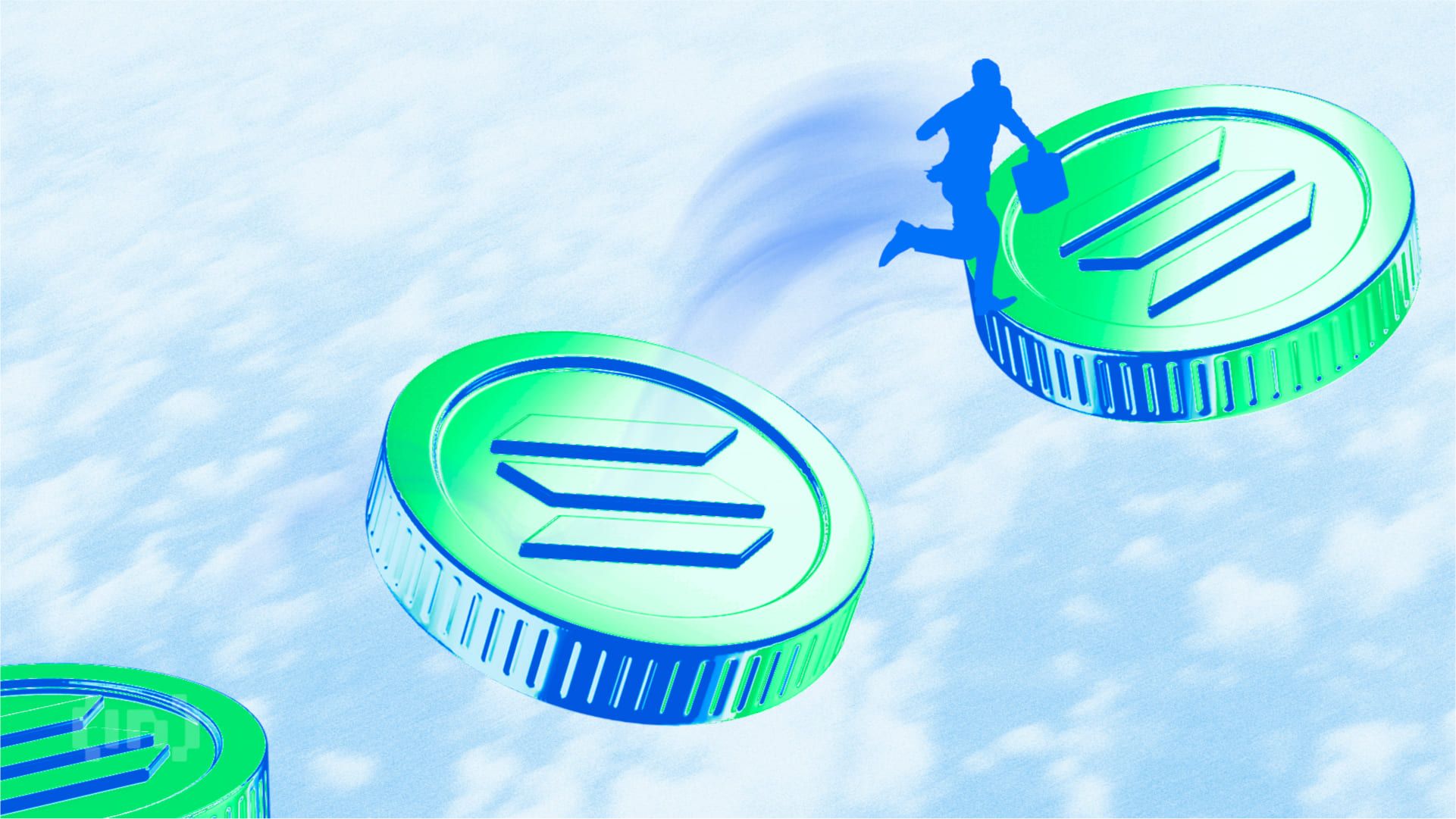
Solana (SOL) continues to show strength across multiple fronts, maintaining a bullish structure on its Ichimoku Cloud chart while gaining momentum in key market metrics. The BBTrend indicator has turned higher again, signaling renewed buying pressure after a brief cooldown.
On-chain activity remains strong, with Solana leading all blockchains in DEX volume and dominating fee generation thanks to the explosive growth of meme coins and launchpad activity. With SOL now trading above a key resistance level, the path is open for further upside—though a loss of momentum could still trigger a retest of lower supports.
Solana Maintains Bullish Structure, but Momentum Faces Key Test
On Solana’s Ichimoku Cloud chart, the price is currently above the Kijun-sen (red base line) but has dipped below the Tenkan-sen (blue conversion line), signaling weakening short-term momentum.
The flattening Tenkan-sen and price behavior suggest possible consolidation or the early stages of a pullback. Still, with the price holding above the Kijun-sen, medium-term support remains intact.
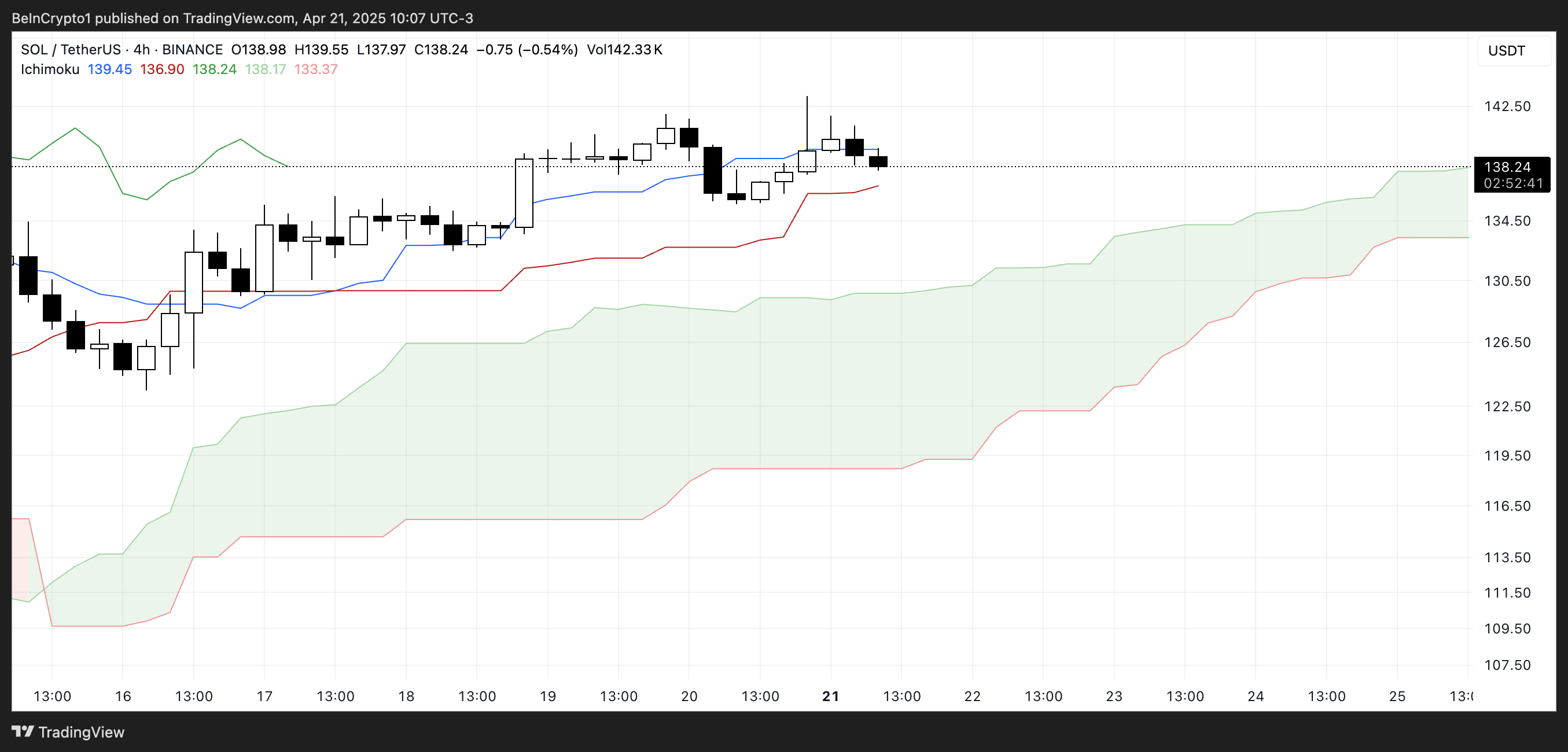
The overall Ichimoku structure remains bullish, with a thick, rising cloud and leading span A well above span B—indicating strong underlying support.
If Solana finds support at the Kijun-sen and climbs back above the Tenkan-sen, the uptrend could regain strength; otherwise, a test of the cloud’s upper boundary may follow.

Meanwhile, Solana’s BBTrend is currently at 6, extending nearly ten days in positive territory after peaking at 17.5 on April 14. The recent increase from 4.26 to 6 suggests renewed bullish momentum following a brief cooldown.
BBTrend, or Bollinger Band Trend, tracks the strength of price movement based on Bollinger Band expansion.
Positive values like the current one point to an active uptrend, and if the BBTrend continues to rise, it could signal stronger momentum and potential for another upward move.
Solana Dominates DEX Volume and Fee Generation as Meme Coins Drive Ecosystem Growth
Solana has once again claimed the top spot among all chains in DEX volume, recording $15.15 billion over the past seven days. The combined total of Ethereum, BNB, Base, and Arbitrum reached $22.7 billion.

In the last 24 hours alone, Solana saw $1.67 billion in volume, largely fueled by its booming meme coin ecosystem and the ongoing launchpad battle between PumpFun and Raydium. Adding to this good momentum, Solana recently surpassed Ethereum in Staking Market Cap.

When it comes to application fees, Solana’s momentum is just as clear. Four of the top ten fee-generating apps over the past week—PumpFun, Jupiter, Jito, and Meteora—are Solana-focused.
Pump leads the pack with nearly $18 million in fees alone.
Solana Breaks Key Resistance as Uptrend Targets Higher Levels, but Risks Remain
Solana has finally broken above its key resistance at $136, flipping it into a new support level that was successfully tested just yesterday.
Its EMA lines remain aligned in a bullish setup, suggesting the uptrend is still intact.
If this momentum continues, SOL price could aim for the next resistance zones at $147 and $152—levels that, if breached, open the door to a potential move toward $179.
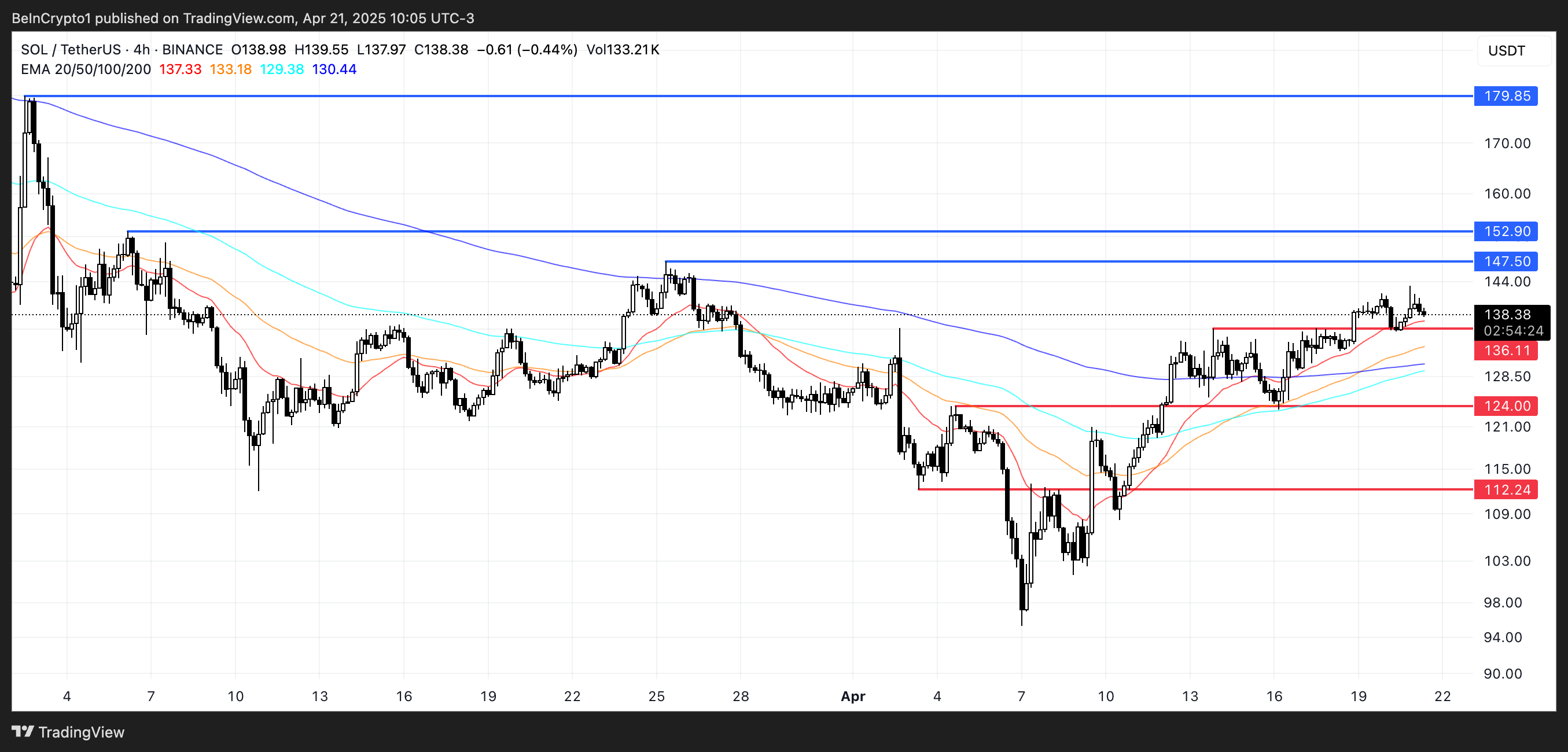
The current structure favors buyers, with higher lows and strong support reinforcing the trend.
However, if momentum fades, a retest of the $136 support is likely.
A breakdown below that level could shift sentiment, exposing Solana to deeper pullbacks toward $124 and even $112.
Disclaimer
In line with the Trust Project guidelines, this price analysis article is for informational purposes only and should not be considered financial or investment advice. BeInCrypto is committed to accurate, unbiased reporting, but market conditions are subject to change without notice. Always conduct your own research and consult with a professional before making any financial decisions. Please note that our Terms and Conditions, Privacy Policy, and Disclaimers have been updated.
Market
Crypto Firms Donated $85 million in Trump’s Inauguration
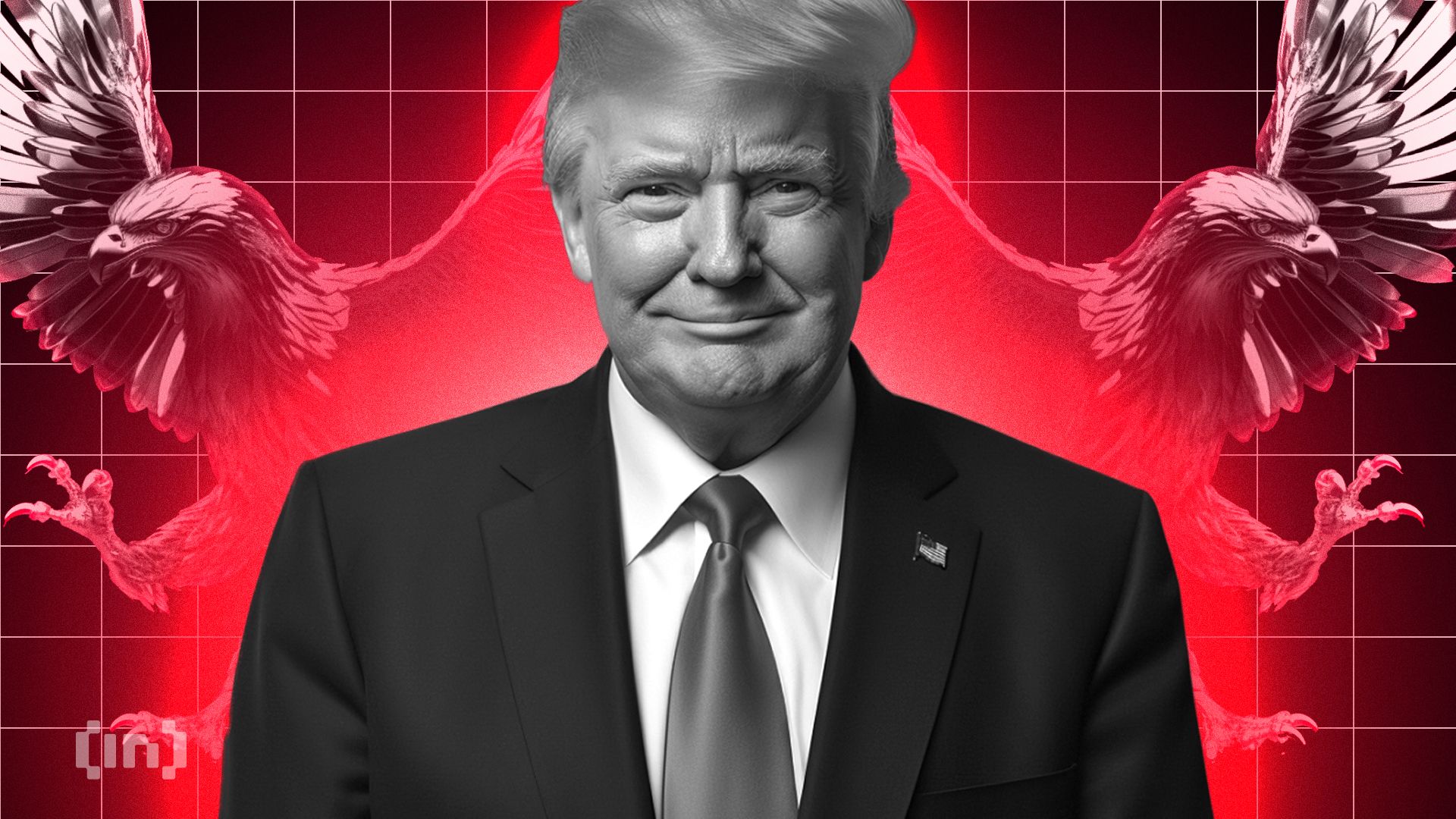
According to a new report, 15 firms and individuals from the crypto industry donated more than $100,000 to President Trump’s Inauguration, totaling over $85 million.
Almost all of these companies apparently received direct or indirect benefits from Trump’s administration. This includes dropped legal proceedings, lucrative business partnerships, participation in Trump’s Crypto Summit, and more.
Crypto Industry Went All-In on Trump’s Inauguration
Since promising to bring friendlier regulations on the campaign trail, Donald Trump attracted a reputation as the Crypto President.
Trump’s Inauguration festivities included a “Crypto Ball,” and several prominent firms made donations for these events. Today, a report has compiled all crypto-related contributions of over $100,000, revealing some interesting facts.

Since taking office, President Trump and his family have been allegedly involved in prominent crypto controversies, and these donations may be linked to several of them.
For example, eight of the donors, Coinbase, Crypto.com, Uniswap, Yuga Labs, Kraken, Ripple, Robinhood, and Consensys, had SEC investigations or lawsuits against them closed since Trump’s term began.
The commission might have dropped its probe against these companies anyway due to its changing stance on crypto enforcement. However, being in the President’s good books likely helped the process.
Further Alleged Benefits for Donors
In other words, nearly half the firms that made donations to Trump’s Inauguration have seen their legal problems cleared up quickly. This isn’t the only regulation-related benefit they allegedly received.
Circle, for example, recently made an IPO after openly stating that Trump’s Presidency made it possible. Galaxy Digital received SEC approval for a major reorganization, a key step for a NASDAQ listing.
Other donors, such as Crypto.com and ONDO, got more direct financial partnerships with businesses associated with the Trump family.
Previously, Ripple’s CEO, Brad Garlinghouse, anticipated a crypto bull market under Trump. Also, XRP, Solana, and Cardano were all unexpectedly included in the US Crypto Reserve announcement.
All three of these companies made major donations to Trump’s Inauguration.
It seems that most of the firms involved got at least some sort of noticeable benefit from these donations. Donors like Multicoin and Paradigm received invitations to Trump’s Crypto Summit, while much more prominent groups like the Ethereum Foundation got snubbed.
Meanwhile, various industry KOLs and community members have already alleged major corruption in Trump’s crypto connections.
While some allegations might lack substantial proof, the crypto space has changed dramatically under the new administration, for both good and bad.
Disclaimer
In adherence to the Trust Project guidelines, BeInCrypto is committed to unbiased, transparent reporting. This news article aims to provide accurate, timely information. However, readers are advised to verify facts independently and consult with a professional before making any decisions based on this content. Please note that our Terms and Conditions, Privacy Policy, and Disclaimers have been updated.
























